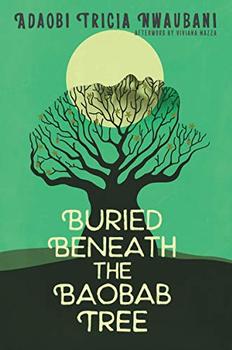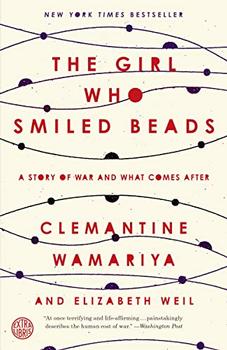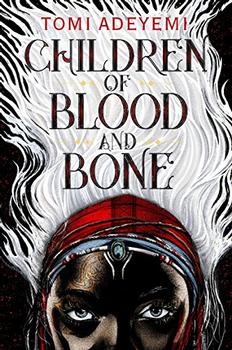Summary | Excerpt | Reviews | Beyond the book | Read-Alikes | Genres & Themes | Author Bio

Ya Ta, the main character in Adaobi Tricia Nwaubani's novel, Buried Beneath the Baobab Tree, lives in rural northeastern Nigeria and is the first student from her village to gain a scholarship to boarding school. In this extremely rural region of the country, many children, both boys and girls, do not complete primary school. Some, like Ya Ta's brothers, stay home to help work the fields, while others are married young and quit school. Here, Christian and Muslim families have long coexisted in harmony, embracing traditional tribal rites while also attending church or mosque. The novel opens with Ya Ta's future plans being interrupted by Boko Haram, a violent militia, raiding her village.
Boko Haram is an armed insurgency that espouses a corrupted vision of Islam. Its name means "western school is forbidden" in the northern Nigerian language of Hausa. Over the past decade, it has gained traction in parts of Nigeria, Niger, Chad, and Cameroon in its attempt to impose Islamic law as the sole law by inflicting violent assaults, threats, and abduction to terrorize civilians and evade the rule of law. The group came to international media attention in 2014 after kidnapping 276 young girls from a school in Chibok, a town in northern Nigeria. As of September 2018, more than 100 Chibok girls remain missing. Thousands of other youth have been taken and more than two million people have been displaced by the Boko Haram terror. Characters in Buried Beneath the Baobab Tree are based on real people interviewed by the author. Historical background is detailed in the afterword, titled "The Chosen Generation," written by Italian journalist Viviana Mazza, who is one of Nwaubani's journalism colleagues.
The novel is set within this current political and cultural context. Ya Ta and her best friends, Sarah and Aisha, are abducted with dozens of other youth including Ya Ta's youngest brother, Jacob, and are held captive at Boko Haram camps hidden in Sambisa Forest. Narrated in first-person by Ya Ta, the story moves quickly through hundreds of very short chapters. Chapter titles such as "Tree of Life", "Once a Month," "The Voice on Papa's Radio," "Gossip," "The Pink Van," "This is Not Islam," "New Clothes," "Showing Off," and "Watching Men" carry readers deep inside this real-world test of survival.
Language is clear, and action is fast-paced. The girls become indoctrinated by their captors and eke out a bare-bones existence hidden away from the world: "'We do not intend to harm you,' the Leader says. 'We only want to make you good Muslim women.' Gripping each other's fingers tight, Sarah and I shift to his left-hand side with the other Christian women and girls, while Aisha stands on the right with the Muslims." Aisha, 14, is already married to a beloved husband arranged by her parents; she is determined to protect her own life and the life of her unborn child. The Christian girls are given new names. Ya Ta becomes Salamatu. Sarah is called Zainab. Captivity tests friendships. Zainab embraces most aspects of life with her new "husband" and camp rules, while Salamatu continues to resist in subtle ways. She seeks comfort in her memories of family, school, faith, and the way life used to be. She imagines a future at university and dreams up ways to escape her "husband," one of the fighters who, for some mysterious reason, always wears a mask. "In any case, whether he chooses to bury his face in a mask because it looks like a hippopotamus bottom or whether he is wary of dazzling damsels with his divine beauty, I do not want to marry him," she says.
Occasionally the captive girls hear rumors that government forces are near and will save them. But rescue is elusive, food is scarce, and loyalties are constantly tested. One day, hunger prompts Salamatu and Zainab to gather edibles from the forest and they delight in discovering a baobab tree (see Beyond the Book). So many of their previous childhood pastimes involved the baobab, they plan to stand on each other's shoulders to harvest fruit. But the truth is soon revealed: their captors have turned the shady area beneath the sacred tree into a mass grave.
Even if liberated, most former captives find return to "normal" life extremely difficult, for a variety of reasons. In the chapter "Better Life" Salamatu wonders: "How will the mother of a child with bad blood lift her head high among normal human beings? Life in the forest might have been better for me."
References to traditional West African images and customs will appeal to readers who want to learn about life in this part of the world. Buried Beneath the Baobab Tree is an ideal choice for book clubs and classroom discussion, and because of its short chapters and clear writing it will engage reluctant readers. Themes in the novel are relevant to contemporary teens everywhere: violence (including school violence), religious freedom, rule of law, gangs, sexual violence, peer pressure, family duty, missing parents, family separation, and teen empowerment. Nwaubani's previous novel I Do Not Come to You by Chance won the 2010 Commonwealth Writers Prize (Africa) for best first book and was a finalist for the Wole Soyinka Prize in Africa - a pan-African writing prize awarded biennially to the best literary work produced by an African. Her journalism appears in many media outlets including The New Yorker, Reuters, and BBC, where she has reported on the Chibok kidnappings and Boko Haram among many other topics.
Ultimately, Nwaubani has created a novel that is a hopeful call out to the resilient human spirit, showcasing young people and their communities who struggle to create a path forward from a place of violence and despair.
![]() This review was originally published in The BookBrowse Review in October 2018, and has been updated for the
March 2020 edition.
Click here to go to this issue.
This review was originally published in The BookBrowse Review in October 2018, and has been updated for the
March 2020 edition.
Click here to go to this issue.

If you liked Buried Beneath the Baobab Tree, try these:

by Elizabeth Weil, Clemantine Wamariya
Published 2019
A riveting story of dislocation, survival, and the power of stories to break or save us.

by Tomi Adeyemi
Published 2019
Winner of the 2018 BookBrowse Award for Best Young Adult Novel
Tomi Adeyemi conjures a stunning world of dark magic and danger in her West African-inspired fantasy debut, perfect for fans of Leigh Bardugo and Sabaa Tahir.
Your guide toexceptional books
BookBrowse seeks out and recommends the best in contemporary fiction and nonfiction—books that not only engage and entertain but also deepen our understanding of ourselves and the world around us.